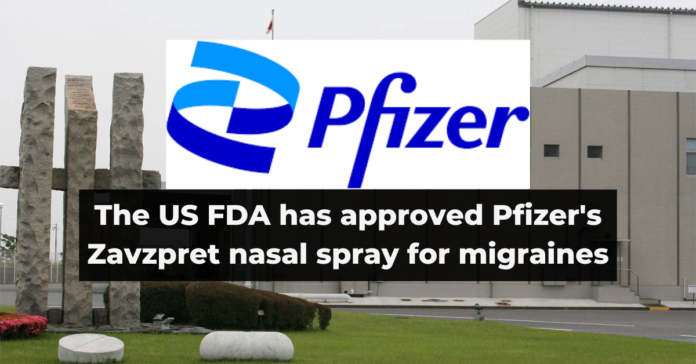Zavzpret (zavegepant), the first and only calcitonin gene-related peptide (CGRP) receptor antagonist nasal spray, has been approved by the US Food and Drug Administration (FDA) for the immediate treatment of migraine in adults with or without aura. Zavzpret was statistically better to placebo on the co-primary objectives of pain freedom and freedom from the most bothersome symptom at two hours after dosage in its pivotal phase 3 study. As a secondary endpoint that was predetermined, the pivotal study also showed that there was pain reduction versus placebo as early as 15 minutes later.
According to Pfizer’s Angela Hwang, chief marketing officer and president of its global biopharmaceuticals division, the FDA’s clearance of Zavzpret represents a significant advance for migraine sufferers who need relief from pain and prefer non-oral treatments. Zavzpret highlights Pfizer’s dedication to provide a different therapeutic alternative to assist migraine sufferers in finding relief and returning to their regular lives. To better assist the billions of people affected by this crippling condition, Pfizer will continue to expand its migraine brand.
The FDA approved Zavzpret for the acute treatment of migraines based on two pivotal randomised, double-blind, placebo-controlled studies that demonstrated the drug’s efficacy, acceptability, and safety characteristics. In these studies, Zavzpret was significantly better than placebo on the co-primary objectives of pain freedom (defined as a reduction from moderate or severe headache pain to no headache pain at two hours post-dose) and freedom from most bothersome symptom (defined as the absence of the self-identified most bothersome symptom). In addition to showing statistically significant superiority to placebo across 13 of 17 prespecified secondary outcome measures, such as early time point endpoints (such as 15 and 30-minute pain relief and return to normal function at 30 minutes), return to normal function at 2 hours, and durable efficacy endpoints, the pivotal Phase 3 study found Zavzpret showed broad efficacy (e.g., 2-24 and 2-48 hour sustained pain freedom and sustained pain relief). Return to normal function at 15 minutes after the last dose, the 14th endpoint, did not show a meaningful difference between Zavzpret and the placebo. Hence, the remaining secondary endpoints were not properly examined in accordance with the trial’s statistical analysis design.
Dr. Kathleen Mullin, associate medical director at the New England Institute for Neurology & Headache, noted that when a migraine strikes, it significantly impairs a person’s everyday life. “One of the most significant characteristics of an acute therapy choice is how quickly it works, according to my migraine sufferers. For those who want pain relief or are unable to take oral medications owing to nausea or vomiting, Zavzpret provides an alternate treatment option so they can swiftly return to normal function.
In clinical trials, zavzpret was well tolerated. Taste problems (including dysgeusia and ageusia), nausea, nose pain, and vomiting were the most frequent side effects recorded in at least 2% of patients treated with Zavzpret and at a frequency greater than placebo. Those who have a history of zavegepant or any of its components hypersensitivity should not take zavzpret. In clinical studies, Zavzpret has caused hypersensitivity reactions, such as face edoema and urticaria. In July 2023, Zavzpret is projected to be offered at pharmacies.
The World Health Organization ranks migraine as the second most common cause of disability worldwide, affecting close to 40 million people in the United States. Migraine is characterised by incapacitating attacks lasting four to 72 hours and a variety of symptoms, such as pulsating headaches of moderate to severe pain intensity frequently accompanied by nausea or vomiting, and/or phonophobia and photophobia (sensitive to light and sound) (photophobia). Miniature molecule for the treatment of migraine, CGRP receptor antagonists are an unique family of medications. This particular method of action provides an alternative to other medications for acute treatment, especially for patients for whom the use of triptans is prohibited, who respond poorly to them, or who are intolerable to them. Rebound headache and medication overuse headache (MOH), which can restrict the therapeutic usefulness of other acute treatments, have not been linked to CGRP signal-blocking medications.
The only CGRP receptor antagonist in clinical development with both oral and intranasal formulations is zavegepant, a third-generation small molecule CGRP receptor antagonist with high affinity, selectivity, and structural uniqueness. For the immediate treatment of migraine in adults, with or without aura, zavzpret (zavegepant) is recommended. Usage Restrictions: Zavzpret is not recommended for the treatment of migraine prevention.



